|
|
|
Sort Order |
|
|
|
Items / Page
|
|
|
|
|
|
|
| Srl | Item |
| 1 |
ID:
143621


|
|
|
|
|
| Summary/Abstract |
The 10-day battle over Mishmar Ha’emek in early April 1948, in which the ‘Arab Liberation Army’, which had penetrated Mandatory Palestine a few months earlier, attempted to storm a strategically located Jewish kibbutz, was a turning point in the ‘civil war’ phase (30 November 1947‒15 May 1948) of Israel’s War of Independence. It largely contributed to the fall of the strategic city of Haifa a fortnight later and the attendant collapse of the Arab war effort in northern Palestine, as well as to the implosion of Palestinian Arab rural society, with its inhabitants becoming victims of events they had only partially taken part in.
|
|
|
|
|
|
|
|
|
|
|
|
|
|
|
|
| 2 |
ID:
143624
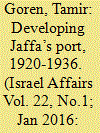

|
|
|
|
|
| Summary/Abstract |
Jaffa port was long renowned as the main harbour of Palestine. From the onset of the British Mandate intense activity in turning it into a modern port resulted in the appointment of a series of committees composed of Arab and Jewish representatives from Jaffa and Tel Aviv. From the start, it was clearly in Tel Aviv’s interest to work for the development of Jaffa port, although the city did not concede its own desire to establish a port of its own; thus the developments taking place at Jaffa port carried implications for Tel Aviv in determining its moves. This article sheds light for the first time on the joint conduct of Jaffa and Tel Aviv regarding the development of the port at Jaffa, and examines its implications. It shows that both cities operated in a considered way before the authorities, and benefited the Jaffa port project, but at the same time Tel Aviv’s ambition for a port of its own was fostered.
|
|
|
|
|
|
|
|
|
|
|
|
|
|
|
|
| 3 |
ID:
143627


|
|
|
|
|
| Summary/Abstract |
Immigration is often accompanied by identity transformation. This article studies the identity of immigrants in the framework of Cooley’s ‘looking-glass’ theory by examining the conceptions of various immigrant groups in Israel of how the veteran majority population perceives them. In addition, it examines the interrelation between immigrant identity as reflected in their self-definition and immigrant beliefs about how the Israeli veteran majority population defines their identity. An empirical analysis was conducted on a representative sample of 437 former Soviet Union (FSU) immigrants and 338 Ethiopian immigrants aged 18‒60 who arrived in Israel under the Law of Return. The findings revealed little congruence among Ethiopian immigrants between their self-definition (mainly Jewish) and their perception of how the majority group defines them (mainly Ethiopian). This lack of congruence implies that in the opinion of a substantive share of Ethiopian immigrants, the majority population in Israel is still not ready to include them within the boundaries of the Israeli-Jewish collective. The findings regarding FSU immigrants show considerable congruence between their self-definition and their belief as to how the veterans define them. Most FSU immigrants, who define themselves as Israelis, think that the majority group sees them as such. The effect of socio-demographic characteristics on immigrants’ identities was also investigated in the study.
|
|
|
|
|
|
|
|
|
|
|
|
|
|
|
|
| 4 |
ID:
143622
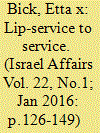

|
|
|
|
|
| Summary/Abstract |
This article explores the social and political dynamics behind the various legislative proposals to establish a civic national service programme in Israel, and the role of Israel’s High Court as a catalytic force for changing policy on this controversial issue. The idea of civic national service for those not inducted into the Israel military has been a controversial issue in Israel since the early years of the state. While Jews and Druze were inducted into the armed forces, Israeli Arabs, religious women and ultra-orthodox yeshiva students were either exempted or deferred from service. Members of Knesset primarily from small parties in the opposition proposed private member bills to establish an alternative civic service for those not serving in the army; however, Israel’s governments rejected these proposals and only in the case of religious Zionist women did the government establish a voluntary programme. Political considerations and coalition politics as well as an interest in protecting the unrivalled predominance of the military (IDF) in Israeli society led successive Israeli governments to maintain the status quo. Only the intervention of the High Court obliged the government to review its policy and take action.
|
|
|
|
|
|
|
|
|
|
|
|
|
|
|
|
| 5 |
ID:
143619
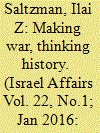

|
|
|
|
|
| Summary/Abstract |
Historical analogies, and historical reasoning, enable policy-makers to overcome major fundamental difficulties in the process of crisis decision-making. By employing lessons and conclusions from past experience, leaders believe they can avoid future failures and make better choices. This paper identifies, for the first time, the key analogies David Ben-Gurion and other key Israeli policy-makers employed prior to the eruption of the Sinai War of October 1956 and their reasoning. It demonstrates that Ben-Gurion was highly sensitive to historical occurrences, personal, national and international, and exhibited great inclination to engage the crisis with Egypt according to the lessons he drew from it. The analogical framework explains the timing of the offensive against Egypt and its distinct nature.
|
|
|
|
|
|
|
|
|
|
|
|
|
|
|
|
| 6 |
ID:
143620


|
|
|
|
|
| Summary/Abstract |
Between 1967 and 1973, Israeli governments took no initiative to set a peace process in motion. Instead, they simply responded to proposals that were raised from time to time, and, for the most part, rejected all of them – the Rogers Plan, Sadat’s willingness to sign a peace agreement and his initiative for an interim settlement – with the sole exception being the ceasefire agreement reached in August 1970. While Israeli policy lacked initiative on the political front, it dedicated much effort to convincing the United States that the greater Israel’s military power, the better its deterrence capabilities would be, which in turn would increase the likelihood of achieving peace. Hence, Israeli leaders’ repeated requests to be supplied with advanced aircraft.
|
|
|
|
|
|
|
|
|
|
|
|
|
|
|
|
| 7 |
ID:
143626
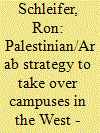

|
|
|
|
|
| Summary/Abstract |
The article examines the Palestinian/Arab two-step strategy in taking over the Middle East discourse on Western (mainly American and British) campuses in the past five decades. During this period, the main theme became “the occupied Palestinian territories” or “The Occupation.” The real objective, though, was and is the de-legitimization of the idea of Jewish statehood. The methodology is based on 150 interviews with Jewish activists who studied or worked on campuses in Europe and the United States during the last thirty-five years. After presenting a chronological survey and then analyzing the strategy’s operational techniques – goals, messages and techniques – the article suggests counter-responses for Israel and presents an outline for further research.
|
|
|
|
|
|
|
|
|
|
|
|
|
|
|
|
| 8 |
ID:
143618
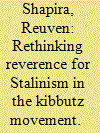

|
|
|
|
|
| Summary/Abstract |
The reverence for Stalinism by the main kibbutz movements, which through revolutionary rhetoric helped perpetuate leaders who had reached the dysfunctional phase, was wrongly interpreted. Historians missed leaders’ efforts to induce reverence and its use for their domination, while social researchers missed its enhancement of oligarchic rule. These are explained by the suppression of critics at the hands of a co-opted functionalist scientific coalition, by ethnographers missing the impact of inter-kibbutz organizations, and by the differentiation of disciplines. Multiple ethnographies of kibbutzim (pl. of kibbutz) and inter-kibbutz organizations and the integration of various findings by a good theory exposed these failures. They point to the required integration of disciplines and to the need for reform of scientific publication decision-making aimed at preventing such failures.
|
|
|
|
|
|
|
|
|
|
|
|
|
|
|
|
| 9 |
ID:
143617
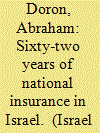

|
|
|
|
|
| Summary/Abstract |
During its 62 years of existence, the National Insurance Institute (NII) has undergone major changes, in line with the radical shifts in Israeli society, that have affected its special status, its functions, the policies it pursued, the organizational and managerial manner of its operation and other aspects of its activities. All these have had an immense impact on the wellbeing of the population as a whole and especially on the welfare of the weaker population groups. This article examines some major features of these changes, including the NII’s position within the governmental structure, the changing nature of public control over the organization, the shift in public attitudes toward its functioning, the protection of value of benefits in times of changing economic circumstances, the extent of its universal approach and its relationship with the insured population.
|
|
|
|
|
|
|
|
|
|
|
|
|
|
|
|
| 10 |
ID:
143623
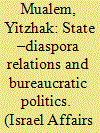

|
|
|
|
|
| Summary/Abstract |
Israeli foreign policy is a complex process comprising national and Jewish dimensions, whereby the government has often to strike a delicate balance between the desire to protect Israel’s national interests and the need to consider the interests of diaspora Jews. This problem becomes particularly pronounced with regard to national security issues as the security echelons tend to interfere in pure foreign policy issues in total disregard of the Jewish dimension of this policy, and nowhere was this phenomenon more starkly demonstrated than the Lavon and Pollard affairs of the 1950s and 1980s.
|
|
|
|
|
|
|
|
|
|
|
|
|
|
|
|
| 11 |
ID:
143625


|
|
|
|
|
| Summary/Abstract |
The political‒cultural paradigm has become a common theoretical framework during recent decades. Scholars use it in diverse disciplines, such as urban sociology and urban politics. This article introduces that framework into the realm of public policy within the context of the university‒community relationship. The well-known university‒community debate follows the question: to what extent should an urban university be involved and engaged in community life? The article examines the case of Ben-Gurion University and the city of Beersheba during 1970‒2012. The findings show that the local university aimed to advance its urban community and to act on behalf of community interests, but the community did not always view this involvement positively, often criticizing it. An analysis using the political‒cultural paradigm finds cultural differences between university and community which result from a long history of conflict and from different collective memories.
|
|
|
|
|
|
|
|
|
|
|
|
|
|
|
|
|
|
|
|
|